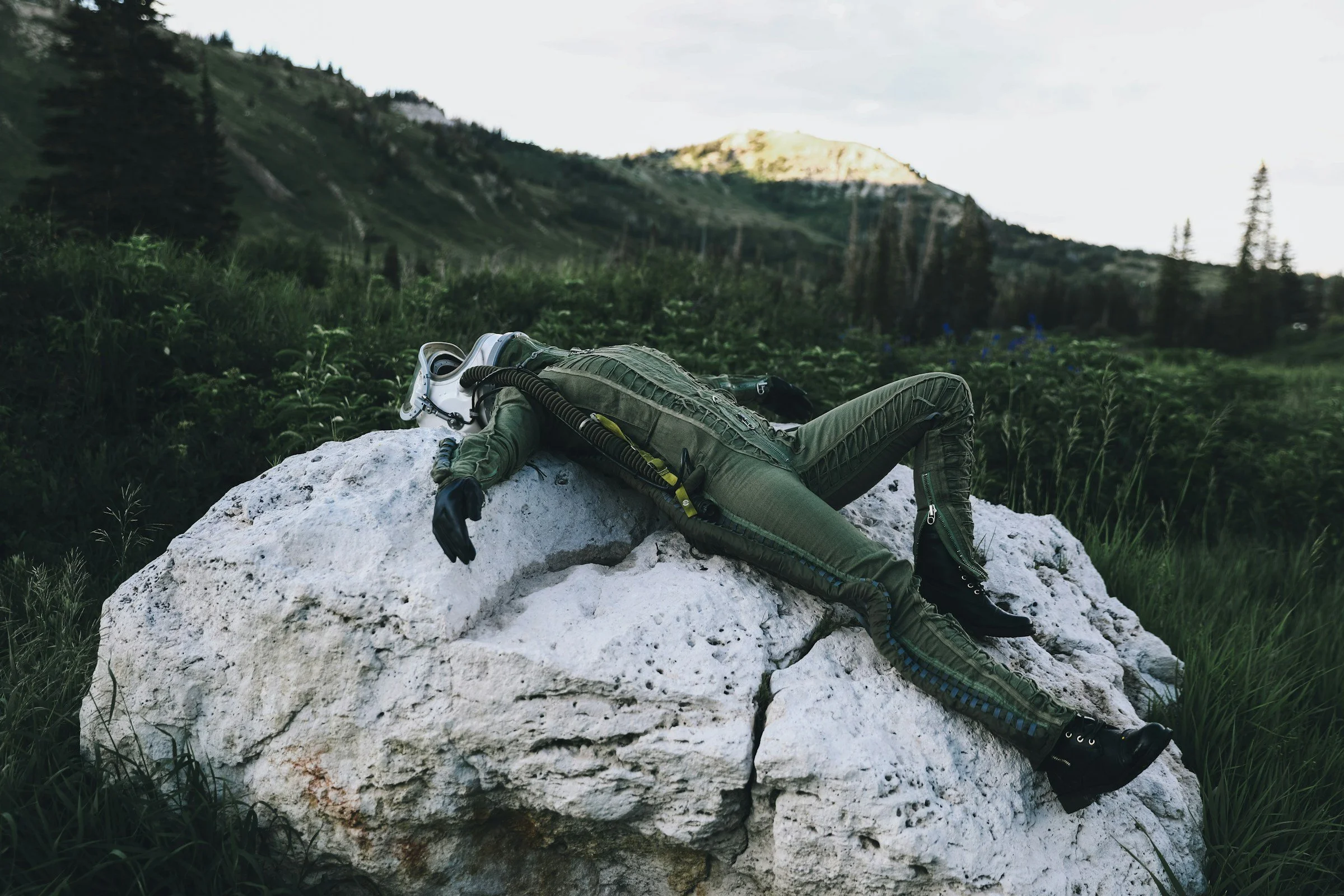"Green on the Dead Earth" by Kristen Johnston— Our June 2025 Bronze Medal Winner
Kristen is our third place winner from the contest posted in our June 2025 issue!
What the judges had to say:
“A devastating picture of the future and yet one filled with hope.”
“Love the plot; it hooked me into reading more.”
“Crafted in the science fiction form yet so human at the same time, this story captivated our attention and left us filled with a sense of wonder. Great story.”
Meet Kristen
Typically a nonprofit communications specialist, I am intrigued by the pain, desolation, and oddly, inspiration from dystopian sci-fi and horror. I dabble in writing dystopian sci-fi and horror, drawn to the beauty hidden in bleakness.
Green on the Dead Earth
the unedited story by Kristen Johnston
“Breathe in 2, exhale 4.”
Celeste slowly let out a warm stream of air from her lips, noting the slight fogging on her helmet’s visor. She needed these deep breaths, to feel her lungs expand and collapse routinely. Her ragged breathing turned steady as more fog accumulated, clouding her vision.
She knew this was the last time she would be on Earth. The final step on land that held her down with gravity. The end of touching blades of grass in a field. The last golden, copper sunset. Celeste mourned this - she didn’t want to leave, protesting hard against her parents’ pleading. She remembered her mother on bended knees, veiny and ashy hands gripping Celeste’s fingers, tear-stained cheeks and red eyes trained on her daughter’s face, begging.
Earth had become inhospitable to human life. A second Chernobyl, experts said. Well, not experts in Celeste’s field of biodiversity. Nuclear scientists and radiologists gave panicked television interviews, appearing on news stations and frantically urging everyone to evacuate.
“There’s still time,” explained a MIT nuclear science professor on the TV, his lifeless, sunken eyes the only visible part of his face, the rest obscured by a gas mask. He looked deep into the camera lens and sighed. “Don’t panic, we will all be fine. Get to your nearest space station and wait for instructions. Our moon colonies are standing by, ready to accept us.” Gravely, he wiped his brow and repeated, “Don’t panic.”
Celeste wasn’t panicking. She was nervous, absolutely, but not panicking. As an ecologist, she was initially devastated by the nuclear explosion. Imagining all the native flora and fauna wiped out, along with humanity, triggered a cool sweat over her body. But it had been a couple of days, and nothing had shriveled up. Birds were still flying, gathering sticks and brambles to make nests. Spring hyacinths were peeking open, displaying their vibrant colours for the world.
Yes, scientists feared that the radiation spikes captured on Geiger counters were unsettling. But nature was proving there might be hope.
She watched the professor attempt to explain how humanity could survive as her mother’s palm gripped her upper arm, her father bouncing his leg as he stood, arms crossed, in front of their outdated television set.
“Do you think the air is breathable now? Are we going to get cancer? Will I just sit here and die?” Celeste’s mother cried nervously, her limp, mousy hair hanging in her face. Celeste hated when her mother got like this, her anxiety clouding any rational thinking. Now was the time to be clear-headed, and her mother was spiraling. Celeste brushed a strand of grey hair behind her mother’s ear, resting her chin gently against her cheek.
“It’ll be fine. You’ll leave home, go to the space station, and safely travel to the Colony. It’s that simple. They’re working overtime to do this, trust me,” Celeste cooed, soothingly. She always had to be her mother’s rock in times of trouble.
Her father whipped his head toward her. “What do you mean ‘you’? Aren’t you coming?” he asked gruffly, placing his hands on his hips. Celeste sighed and rubbed her eyes, glancing out the window at the newly budding hyacinth.
“I need to stay,” she started carefully. “Giselle, you know, my mentor from work? She said there’s word from Asia that plants and animals are surviving just fine. Same down in South America. She wants me to lead a team here, to see if life can be saved.”
She winced as her mother’s grip tightened, nails digging into Celeste’s flesh.
“No. No, no, no. You are not that stupid and selfish,” her mother exclaimed, yanking on Celeste’s arm with a sharp pull. “I worked too hard to bring you into this world, and you are not going to take that away from me.”
Celeste stood, anger coursing through her veins. “You don’t get to make that choice. Earth might be inhospitable to humans, but that doesn’t mean we should give up. We know nothing.”
Her father, shaking his head in disbelief, sniffed and turned his eyes to the floor. “Do those plants mean more to you than your parents?”
Sadly, with guilt in her heart, she felt tears well up in her eyes. She couldn’t answer truthfully.
Sprawled out on a rock near the space station, Celeste felt the weight of her anti-radiation suit pressed against her chest. She was languishing, just for a moment, slowly breathing to regulate her mind. While the nerves were there, living on a planet that seemed to want to choke the life from her, was disconcerting. But there was also excitement.
Through her helmet she could still hear robins singing their morning songs and streams of clear water bubbling in nearby rivers. The sky had taken on a slight greenish hue, but there were still pockets of bright blue peeking through.
Her parents had left yesterday after long, drawn-out goodbyes. She loved them, of course. But Celeste knew that this distance was good for them. This chance to focus on her work, to search for answers and collect data. To help save humanity.
She heard a thud approaching - the heavy clunking of radiation suits and thick work boots worn by those left behind. A figure came into view, waving. While she couldn’t see through the visor, she knew it was Giselle - her easy gait, the way she walked toe to heel.
Without getting up, Celeste flashed a peace sign, signaling she was ready. Her team was waiting for her back at home base. Giselle walked to the boulder and extended her hand, ready to pull Celeste to her feet.
As Celeste grasped her colleague’s hand, her heart fluttered. She thought of the future, all the unknowns racing in her mind. What this moment meant: for her, for Earth, for humanity.
This might be the end of humanity, but it was also the beginning. The Earth was bruised, but still breathing.
Use the comment form below to let Kristen know what you thought of her story.


